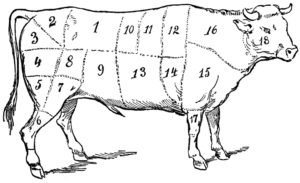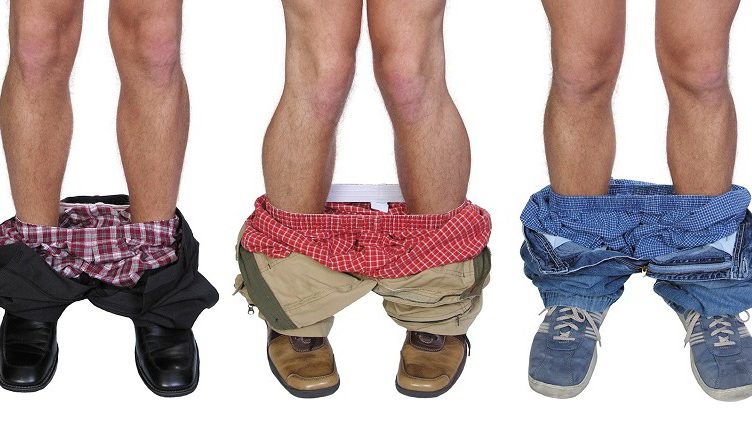From Leviticus 14-15

Bodily discharges are not the kind of topic that attract many mouse clicks. However they are a part of life and today we learn a little bit about how they were handled under the purity laws.
This post is part of my bible in a year series.
Passage and Comments
Our chapter today concerns male and female bodily emissions. The passage begins with morbid male discharges (Lev 15.1-15), normal male emissions (Lev 15.16-17) and then sexual intercourse (Lev 15.18). In the passage I quote the author is writing about female menstruation and abnormal female discharges.
The laws highlight uncleanliness spreads by touch and can spread easily. People would have to be mindful if they or others were unclean and behave accordingly.
These laws coincidentally would have helped Israel to keep up hygiene levels.
19 “When a woman has a discharge, and the discharge in her body is blood, she shall be in her menstrual impurity for seven days, and whoever touches her shall be unclean until the evening.
20 And everything on which she lies during her menstrual impurity shall be unclean. Everything also on which she sits shall be unclean. 21 And whoever touches her bed shall wash his clothes and bathe himself in water and be unclean until the evening. 22 And whoever touches anything on which she sits shall wash his clothes and bathe himself in water and be unclean until the evening. 23 Whether it is the bed or anything on which she sits, when he touches it he shall be unclean until the evening.
24 And if any man lies with her and her menstrual impurity comes upon him, he shall be unclean seven days, and every bed on which he lies shall be unclean.(Lev 15.19-24)
‘Menstrual impurity’. Menstruation is a fairly severe impurity, lasting seven days. But it was also a normal and regular occurrence.
25 “If a woman has a discharge of blood for many days, not at the time of her menstrual impurity, or if she has a discharge beyond the time of her impurity, all the days of the discharge she shall continue in uncleanness. As in the days of her impurity, she shall be unclean.
26 Every bed on which she lies, all the days of her discharge, shall be to her as the bed of her impurity. And everything on which she sits shall be unclean, as in the uncleanness of her menstrual impurity. 27 And whoever touches these things shall be unclean, and shall wash his clothes and bathe himself in water and be unclean until the evening. 28 But if she is cleansed of her discharge, she shall count for herself seven days, and after that she shall be clean.
29 And on the eighth day she shall take two turtledoves or two pigeons and bring them to the priest, to the entrance of the tent of meeting. 30 And the priest shall use one for a sin offering and the other for a burnt offering. And the priest shall make atonement for her before the LORD for her unclean discharge.(Lev 15.25-30)
‘Atonement’. Interestingly for both men and women, only the abnormal discharges required a sacrifice to make atonement. The normal discharges only required washing.

31 “Thus you shall keep the people of Israel separate from their uncleanness, lest they die in their uncleanness by defiling my tabernacle that is in their midst.”
32 This is the law for him who has a discharge and for him who has an emission of semen, becoming unclean thereby; 33 also for her who is unwell with her menstrual impurity, that is, for anyone, male or female, who has a discharge, and for the man who lies with a woman who is unclean. (Lev 15.31-33)
‘Defiling my tabernacle’. The end of the chapter highlights the potential spread of uncleanness can defile the sanctuary, which was in the middle of the camp. Disregard for the purity laws implies disrespect for the holiness of God.
Story of Israel

In chapter 15 the Lord does not forbid the Israelites to incur the genital impurities. Indeed, it would be useless to do so because most of them are involuntary, and voluntary sexual intercourse is essential to continue the nation. However, God does demand that the Israelites limit effects of impurities to prevent their encroachment on the holy realm centered at the sanctuary. The people are to do this by taking precautions to avoid contact between impurity and holiness and by carrying out the appropriate ritual remedies that he has provided. (Gane, R., 2004. Leviticus, Numbers, Grand Rapids, MI: Zondervan.)
Story of Jesus
Impurity also has a moral element to it. The spread of the uncleanliness reminds us that sin also has a defiling impact on whole communities and angers our Holy God.
Fortunately in the Gospel we are reminded Jesus can make the unclean – clean. He stepped into our unclean world and made people clean.
And a great crowd followed him and thronged about him. 25 And there was a woman who had had a discharge of blood for twelve years, 26 and who had suffered much under many physicians, and had spent all that she had, and was no better but rather grew worse.
27 She had heard the reports about Jesus and came up behind him in the crowd and touched his garment. 28 For she said, “If I touch even his garments, I will be made well.” 29 And immediately the flow of blood dried up, and she felt in her body that she was healed of her disease.
30 And Jesus, perceiving in himself that power had gone out from him, immediately turned about in the crowd and said, “Who touched my garments?” 31 And his disciples said to him, “You see the crowd pressing around you, and yet you say, ‘Who touched me?’ ” 32 And he looked around to see who had done it.
33 But the woman, knowing what had happened to her, came in fear and trembling and fell down before him and told him the whole truth. 34 And he said to her, “Daughter, your faith has made you well; go in peace, and be healed of your disease.” (Mk 5.24-34)
What kinds of things make you unclean? Do you need to touch Jesus?
Copyright © Joshua Washington and thescripturesays, 2015. All Rights Reserved.

